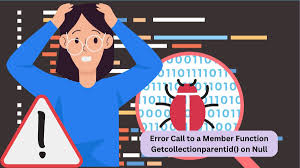The error message error call to a member function getcollectionparentid() on null is a common issue encountered by developers working with PHP-based content management systems (CMS) like Concrete5, Magento, or custom-built frameworks. This error occurs when your code attempts to execute the getCollectionParentId() method on an object that hasn’t been instantiated, meaning that the object is null at the time of the method call. In simpler terms, the code is trying to access a property or method of something that doesn’t exist.
To put it into context, imagine you are trying to retrieve the parent ID of a collection of articles or products on your website. The system expects that every article or product belongs to a specific parent category or collection. However, if the database query fails to retrieve the required data, or if there’s a misconfiguration, the collection object may be null. When the code tries to run getCollectionParentId() on this non-existent object, it results in the error call to a member function getcollectionparentid() on null error. This is a frustrating issue, as it can cause parts of your website or application to malfunction, leading to a poor user experience and potential downtime.
This error is particularly important to address because it indicates a deeper issue within the logic of your application. Failing to handle such errors can lead to more significant problems, including application crashes or data inconsistencies. Therefore, understanding the root cause and knowing how to fix it is crucial for maintaining a stable and reliable application.
Table of Contents
Understanding and Resolving the error call to a member function getcollectionparentid() on null
The error message error call to a member function getcollectionparentid() on null is a frequent challenge encountered by developers, especially those working with PHP-based content management systems (CMS) like Concrete5, Magento, or custom frameworks. This error typically arises when your code attempts to execute the getCollectionParentId() method on an object that hasn’t been instantiated, meaning that the object is null at the time of the method call. In simpler terms, the code is trying to access a property or method of something that doesn’t exist.
Imagine you are trying to retrieve the parent ID of a collection of articles or products on your website. The system expects every article or product to belong to a specific parent category or collection. However, if the database query fails to retrieve the required data, or if there’s a misconfiguration, the collection object may be null. When the code tries to run getCollectionParentId() on this non-existent object, it results in the error call to a member function getcollectionparentid() on null. This can be particularly frustrating as it may cause parts of your website or application to malfunction, leading to a poor user experience and potential downtime.
This error is critical because it indicates a deeper issue within the logic of your application. Failing to handle such errors can lead to more significant problems, including application crashes or data inconsistencies. Therefore, understanding the root cause and knowing how to fix it is crucial for maintaining a stable and reliable application.
What Causes the error call to a member function getcollectionparentid() on null
The error call to a member function getcollectionparentid() on null can stem from various sources, often related to how data is handled within your application. One of the most common causes is uninitialized objects. When the code expects an object to exist and attempts to call a method on it, but the object hasn’t been properly created or initialized, the result is a null reference. This often occurs when there are issues with how objects are instantiated or when certain conditions aren’t met for the object to be created.
Another frequent cause is faulty database queries. If a query meant to fetch data from the database fails to retrieve the expected results, the object that relies on this data will be null. For instance, if a query is supposed to fetch a collection from a database table, but due to incorrect SQL syntax, the query returns no rows, the collection object will be null. This is a typical scenario where the error manifests, particularly in CMS platforms that heavily rely on database-driven content.
Incorrect logic in the code can also lead to this error. For example, conditional statements that fail to account for scenarios where an object might not be set can result in null references. If your code assumes that a collection always exists without validating this assumption, it can cause the error call to a member function getcollectionparentid() on null when no collection is found.
Additionally, configuration errors within the CMS or application setup can contribute to this issue. If the application configuration is missing crucial settings or is incorrectly set up, it might prevent the creation of objects, leading to null references when methods are called on these non-existent objects. This is particularly common in environments where the application is moved from one server to another without proper reconfiguration.
Understanding the specific cause in your scenario requires careful examination of the code, database queries, and application configuration to identify where the null reference is introduced.
How to Troubleshoot and Resolve the Error
When faced with the error call to a member function getcollectionparentid() on null, it’s essential to follow a systematic approach to troubleshooting and resolving the issue. The first step is to identify where the null reference occurs. This can be done by examining error logs, which often provide a stack trace showing the exact line of code where the error occurred. By pinpointing the location, you can better understand which object is null and why.
Next, it’s crucial to validate objects before calling functions. This involves adding checks in your code to ensure that the object is not null before attempting to call methods on it. For instance:
This simple check can prevent the error from occurring and allows you to handle the situation more gracefully, perhaps by displaying a user-friendly error message or attempting to retrieve the data again.
Another important step is to review your database queries. Ensure that your queries are correctly structured and are returning the expected results. Sometimes, a query might fail silently, returning no results and leaving your objects uninitialized. By debugging the query and checking the results before proceeding, you can avoid null references:
Keeping your software and dependencies updated is another critical aspect of resolving this error. Update and patch your software regularly, including your PHP version, CMS, and any plugins or modules your application relies on. Sometimes, the error might be due to outdated code or deprecated functions that no longer work as expected in newer environments.
Lastly, consider using debugging tools like Xdebug to step through your code and watch how variables and objects are initialized. By carefully examining the execution flow, you can identify where the null reference occurs and why. Debugging tools can also help you monitor the state of variables at different stages of the code execution, making it easier to spot anomalies.
Preventing the error call to a member function getcollectionparentid() on null
Preventing the error call to a member function getcollectionparentid() on null in the future involves implementing several best practices in your coding and development process. One of the most effective strategies is to ensure proper object initialization. Always verify that objects are created and initialized before you attempt to use them. This might involve adding checks throughout your code to confirm that an object exists before calling its methods.
Comprehensive error handling is another crucial preventive measure. By implementing robust error handling, you can manage unexpected situations where an object might be null. For example, using try-catch blocks to catch exceptions and handle them gracefully can prevent your application from crashing when a null reference is encountered. Proper error handling not only improves the stability of your application but also enhances the user experience by providing informative error messages instead of abrupt failures.
Another key preventive measure is conducting regular code reviews. Code reviews help identify potential issues in the codebase, including scenarios where null references might occur. During a code review, a developer can look for places where methods are called without first checking if the object is null. Regularly reviewing your code can help catch these issues early, reducing the chances of encountering errors in production.
In addition to these practices, automated testing plays a significant role in preventing errors. Implementing unit tests, integration tests, and end-to-end tests ensures that your code behaves as expected under various conditions. Automated tests can simulate different scenarios, including cases where objects might be null, allowing you to catch potential issues before they make it into production.
Common Mistakes to Avoid
When dealing with the “getCollectionParentId() on null” error, several common mistakes can exacerbate the problem or prevent it from being resolved effectively. One of the most significant mistakes is ignoring error logs. Error logs are invaluable tools that provide detailed information about what went wrong in your application. Failing to review these logs can leave you blind to the root cause of the issue, making it difficult to implement an effective fix.
Another common mistake is inadequate testing. Skipping thorough testing, especially after making changes to the code or configuration, can lead to undetected bugs making their way into production. Inadequate testing is particularly problematic in complex applications where different parts of the system are tightly interconnected. Without proper testing, a small change in one area can cause unexpected issues in another, leading to errors like “getCollectionParentId() on null”.
In addition, poor documentation can make it harder to diagnose and fix errors. When code is not well-documented, it can be challenging to understand how different parts of the application interact, increasing the risk of introducing null references. Proper documentation helps developers understand the intended behavior of the code, making it easier to spot where things might go wrong.
Leveraging Community Support and Resources
When faced with complex errors like error call to a member function getcollectionparentid() on null, leveraging community support can be incredibly valuable. Online forums and developer communities, such as Stack Overflow, Reddit, and GitHub, are excellent resources for finding solutions to common problems. These platforms allow you to ask questions, share your experiences, and learn from other developers who have faced similar issues.
When seeking help online, it’s important to provide as much detail as possible about your problem. Include information such as code snippets, error messages, and the steps you’ve already taken to try to resolve the issue. This helps others understand your situation and provide more accurate advice.
In some cases, the problem might be too complex to resolve on your own or through community support. If you’ve tried everything and the issue persists, it may be time to seek professional help. Hiring a developer with experience in your specific CMS or framework can save you time and ensure the issue is resolved correctly. Platforms like Upwork and Toptal are good places to find professional developers who can assist with challenging issues.
conclusion
In conclusion, the error call to a member function getcollectionparentid() on null is a common but preventable issue that often arises due to uninitialized objects, faulty database queries, or incorrect code logic. By understanding its causes, implementing thorough troubleshooting techniques, and adhering to best practices like proper object initialization, comprehensive error handling, and regular code reviews, developers can effectively manage and prevent this error. Leveraging community support and professional help when necessary further enhances your ability to maintain a robust and error-free application, ensuring a seamless user experience.
Read More: SIA 588B AITimes







